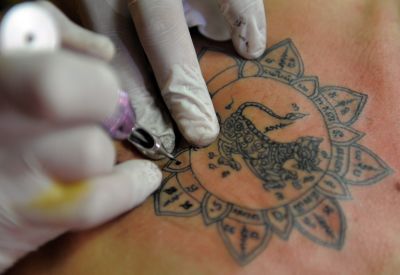Modernity casts spell over magic tattoos in Cambodia

Your support helps us to tell the story
From reproductive rights to climate change to Big Tech, The Independent is on the ground when the story is developing. Whether it's investigating the financials of Elon Musk's pro-Trump PAC or producing our latest documentary, 'The A Word', which shines a light on the American women fighting for reproductive rights, we know how important it is to parse out the facts from the messaging.
At such a critical moment in US history, we need reporters on the ground. Your donation allows us to keep sending journalists to speak to both sides of the story.
The Independent is trusted by Americans across the entire political spectrum. And unlike many other quality news outlets, we choose not to lock Americans out of our reporting and analysis with paywalls. We believe quality journalism should be available to everyone, paid for by those who can afford it.
Your support makes all the difference.It's much harder to get a magic tattoo in Cambodia than it used to be, laments Chey Cham.
"I do have one tattoo of a python on my right upper-arm but it's for beauty, not magic," says the 30-year-old from the outskirts of Cambodia's capital.
"That's because I can't find anywhere in my town to get a magic tattoo."
Over centuries, Cambodians have endured hours of procedures to obtain hand-drawn mystical tattoos believed to give them magical powers, but the tradition appears to be fading in this increasingly modern country.
Miech Ponn, advisor on mores and customs at Cambodia's Buddhist Institute, says magic tattoos are believed to bring good luck or popularity but are mostly used by soldiers seeking to become invisible to enemies or repel bullets.
"Tattoos were really popular among Cambodian men in the past. Almost every Cambodian male was tattooed," Miech Ponn says.
These days, he adds, superstitious people in rural areas are usually the ones who believe in magic.
"Until now science can't break this superstition. I don't know why it cannot."
Tattooist Chan Trea notices the number of customers seeking him out in the belief they will obtain special powers has dwindled over the past decade.
"Usually, the Cambodian customers are police, soldiers, and fighters like boxers and martial artists," Chan Trea says.
"But there is a decrease of people coming for magical reasons. I guess, in the future, things like magic will be very rare in this country."
The tattoos usually feature images of supernatural creatures, Hindu gods or characters from Pali and Sanskrit. Cambodian fighters are often adorned with intimidating images of a dragon, tiger or the monkey king Hanuman.
Chan Trea notes the tattoos can be administered by any traditional healer or Buddhist monk who has strong spiritual beliefs, but only a few remain alive who know how to use traditional long needles and recite magical spells.
These esteemed tattooists draw magic tattoos by hand with two or three sewing needles tied together, poking black, blue or red ink into the skin.
But for those seeking powers, the process isn't as simple as getting poked by a few needles, says the Buddhist Institute's Miech Ponn.
Those who drink alcohol or have extramarital affairs risk decreasing the magic from their tattoos, he says.
He adds that people getting the tattoos also must refrain from eating purple potatoes, gourds or star fruit to ensure the spells work - while for soldiers on the battlefield, stealing breaks a tattoo's magic.
A national hero, Cambodian heavyweight kickboxing champion Ei Phuthong, says he owes part of his decade-long reign to his magic tattoos.
With a mystical flying creature and the Hindu god Vishnu on his back, as well as a "Great Weight" Pali symbol on his right hand, he believes he gets more power in his punch.
"Of course I believe in magic tattoos, though it is inexplicable," he says. "They have helped me win. With them, I feel more than a match for my opponent in the ring."
The belief in the power of tattoos is most evident among hardened Cambodian troops stationed near the Thai border, where a territorial dispute over the past year has erupted into skirmishes which have killed seven soldiers.
One soldier near the area at the centre of the dispute, a 46-year-old who gives his name only as Oeurn, says he and most of his comrades have magic tattoos for protection.
The value of the magical Sanskrit patterns tattooed on his back and chest was proven, he says, during an April gunbattle which killed three Cambodian troops.
"At that time, many bullets were showered toward me," Oeurn claims, "but magically they were averted away."
Join our commenting forum
Join thought-provoking conversations, follow other Independent readers and see their replies
Comments